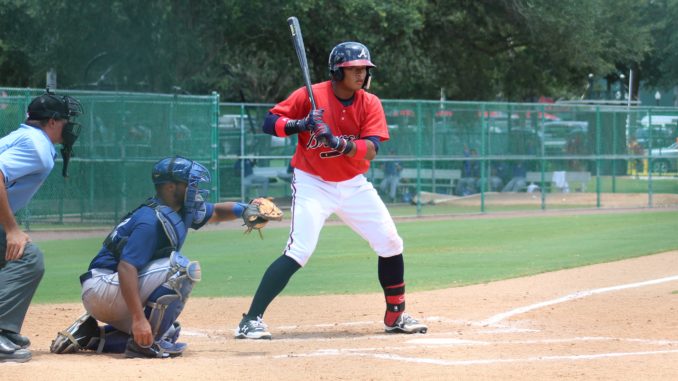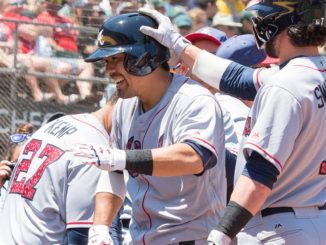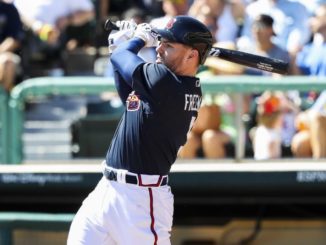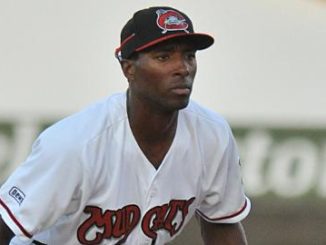
Ever since the stunning announcement on October 2 of the forced resignations of general manager John Coppolella and director of international scouting Gordon Blakeley for “a breach of Major League Baseball rules regarding the international player market”, Braves fans have been waiting for word for the exact infractions and what penalties MLB will impose on the franchise.
The ripple effect had already caused some interesting developments. Manager Brian Snitker, who was seen as unlikely to be brought back after the season, had his option picked up in anticipation of wanting to provide continuity and stability on the field for players and fans. This happened before the hiring of a general manager, which happened five weeks later with the announcement that former Blue Jays GM Alex Andropolous had agreed to take the reins of the organization.
At the press conference introducing Andropolous, team president Terry McQuirk pointedly indicated that president of baseball operations John Hart was no longer in the chain of command and would take on a senior advisory role, and that Andropolous had carte blanche to run the franchise. After Hart was quoted at the general managers meetings last week indicating he was still in baseball operations, the Braves announced the following day that Hart was no longer with the team, seeking out “other opportunities outside the organization”.
The Infractions and Penalties
Now fifty-one days since Coppollela and Blakeney’s departure, we have the ruling from MLB. The infractions included:
- packaging multiple players across signing periods; the Braves paid five players in the 2015/16 signing period to lower bonuses than agreed to in order to stay within their international spending limits; this allowed the Braves to pay higher bonuses in their planed 2016/17 bonus blow-out. The player agents funneled bonus money from players signed but not subject to the restrictions to the restricted players.
- paying Korean shortstop Jihwan Bae more than the league-mandated $300,000 bonus “under the table”.
- offering a 2017 draft pick (presumed to be 2nd-rounder Drew Waters, though he was not named) additional incentive to sign with Atlanta beyond his signing bonus; Waters did not receive any additional compensation.
The penalties are severe, by far the most far-ranging imposed on a team. They include:
- the revocation of the rights of 13 prospects: SS Kevin Maitan, C Abrahan Gutierrez, 2B Yunior Severino, RHP Yefri Del Rosario, RHP Juan Contreras, SS Livan Soto, SS Yenci Pena, RHP Guillermo Zuninga, OF Antonio Sucre, OF Juan Carlos Negret, OF Brandol Mezquit, OF Angel Rojas, and SS Jihwan Bae.
- the loss of all of the bonus money paid to the players, plus the penalties already paid to MLB for the Braves’ planned overage of 2016/17 international spending limits. All together, this represents approximately $25 million in payments that will essentially amount to nothing but embarrassment.
- the loss of the 3rd-round draft pick in the 2018 draft.
- the restriction of the team from signing an international free agent for a bonus greater than $10,000 during the 2019/20 signing period.
- the loss of half of the team’s international bonus pool for the 2020/21 signing period.
- a restriction from signing coveted amateur prospect Robert Puason, a player that had already been linked to the Braves.
- former GM John Coppolella has been banned from baseball for life, while Gordon Blakeley receives a one-year suspension.
- other team officials may be subject to further punishment, pending internal Braves review.
LINK TO STATEMENT FROM COMMISSIONER ROB MANFRED
Maitan is the biggest name of the group. Maitan was going to be the #10 prospect in the still ongoing Fifty Prospects In Fifty Days series. While an amateur, Maitan was already getting compared to Venezuelan sluggers like Miguel Cabrera and Miguel Sano. While it was unlikely anyone would rise to those comparisons, Maitan does represent a significant loss of potential from the organization, and of course a loss of the reported $4.25 million the Braves spent to sign him.
Gutierrez came in at #33 on the prospect list. Gutierrez was hyped from a very young age, but his prospect status had cooled even prior to signing as his body filled out and there was some question if he would be able to stay behind the plate. Those concerns were partially allayed with a solid performance in the Gulf Coast League this summer. The Braves reportedly spent $3.53 million on his signing bonus.
Severino is a hard-hitting infielder that was placed at #26 on the OFR top 50 list. Signed as a shortstop, Severino had already been relegated to second base. Nevertheless, Severino’s bat made an impression; other than Maitan, this loss hurts the most. The Braves reportedly paid a $1.9 million bonus for his rights.
Del Rosario was a coveted arm and was reportedly pursued by multiple teams prior to signing with the Braves for a $1 million bonus. He came in at #27 on the OFR top 50 list, and was the most exciting pitcher in the Braves rookie leagues other than 2016 second-rounder Kyle Muller.
The prospects following this were not in the OFR Top 50 prospects list.
Contreras is a very hard-throwing right hander that showed fairly significant control issues in his time with the GCL Braves. Mechanically he’s more of a project and would likely have been a slow burn through the organization, but a power pitcher with his stuff will be of significant interest to other teams as he now becomes a free agent again. The Braves spent a reported $1.2 million for his rights.
Soto is a relatively advanced glove man at shortstop who showed the potential for a solid line-drive offensive approach this season with the GCL Braves. He signed for a $1 million bonus.
Pena signed with the Braves for a reported $1.05 million bonus. A bat-first infielder, Pena spent the 2017 season in the Dominican Summer League.
Zuninga was an older signing in the 2016/17 signing period and got into some Dominican Summer League action before the end of the 2016 season. Zuninga spent the 2017 season in the Gulf Coast League, other than a few strange days where he was on the Florida Fire Frogs roster. Zuninga got a $350,000 bonus.
Sucre secured a $300,000 bonus from the Braves. A 5′-11″ outfielder with a power stroke, Sucre spent the 2017 season in the DSL. Sucre was named as a prospect who was signed to a lower bonus as part of a package to sign other players represented by his agent to higher bonuses.
Negret was one of the better offensive players on the DSL Braves in 2017, hitting .264/.410/.391 and stealing 23 bases. Mezquit and Rojas were signed in the current signing period and had not played yet for the organization.
Bae was signed out of Korea as part of the 2017/18 signing period and received only a reported $300,000 signing bonus. While he didn’t make the OFR Top 50 list, that was more indicative of his late signing; his skill set was compared at to Nationals shortstop Trea Turner by a team official.
What Does This All Mean?
In the short term, these penalties mean very little to the 2018 Atlanta Braves, or even the 2019, 2020, or 2021 Braves. It was unlikely that any of the lost prospects would have played a part on those teams or had any other effect, other than possibly to be used as trade chips to acquire major league talent.
Where this hurts the team the most however is down the road. These prospects represented some of the top position player talent in the Braves system. The organization was able to concentrate on acquiring high-upside young pitching in the domestic draft because they knew that they would be able to fill the position player pipeline with these international signings.
Now, not only are some of those prospects gone, but that international pipeline will continue to be constricted for the near future. A team with the payroll constraints of the Braves requires a steady influx of young talent into the farm system to eventually feed to the major league team. The limitations put in place puts a severe crimp into the pipeline of new talent. Even with the Braves already under the penalty for blowing past their international bonus pool in the 2016/17 signing period, this extends and intensifies the limitations into the next decade. The Braves will be relying heavily on the domestic draft to keep the talent pipeline primed, putting that much more pressure to make every draft pick count. This could cause a shift in draft philosophy away from riskier prep talent to more college players with a more established pedigree, but with potentially lower upside.
The Braves will still have access to their international bonus pools in the current and next two signing seasons. With their current restrictions, look for Atlanta to try to trade those pools to other teams in order to continue to bring in talent.
— Atlanta Braves (@Braves) November 21, 2017
Baseball America’s Ben Badler and Yahoo! Sports’ Jeff Passen were the first journalists with details on this story.




Man that hurts. I was expecting the hammer to drop, but I guess I didn’t realize how big of a hammer they were using.